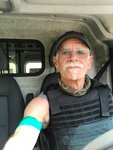
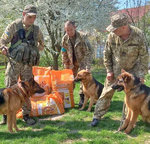
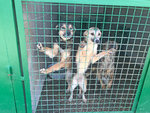
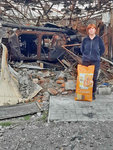
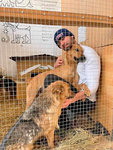
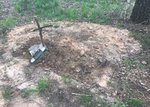
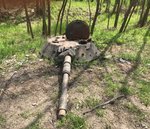
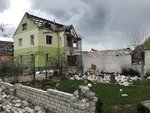
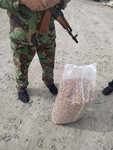

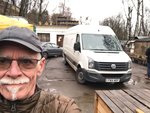
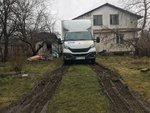
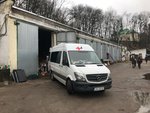
Approximately 5 million people had fled Ukraine and another 8 million were internally displaced as of May 15 after their country was invaded by the Russian Federation Feb. 24. Many who ran tried to take their pets with them, but at least 1 million animals were abandoned, according to the Humane Society International.
The Ukraine-based animal rights organization UAnimals discovered 485 dogs that had starved to death in locked cages at a deserted animal shelter in Borodyanka in the Bucha region of Kyiv (KEE-ef), the site of multiple atrocities allegedly committed by Russian soldiers.
One dog saved by the Polish ADA Foundation had been shot eight times and was paralyzed. Other animals — dogs, cats, horses — were missing limbs or were wounded by shrapnel. All were traumatized.
A Lakebay man thought he could do something about that.
Tom Bates, 68, is a retired truck driver who had never been to Europe. He landed in Kraków, Poland, March 23 and volunteered for local animal rescue efforts for three weeks, walking dogs, organizing warehouses, and driving trucks to Lviv (l-VEE-u) to deliver supplies.
“Before retiring, my very last job was with the Washington State Fair Foundation, and I worked in a program called the traveling farm,” he said. “We had a truck that carried the sheep, goats, chickens, ducks, rabbits, pigs, and we’d have some portable pens we’d set up and we’d teach elementary kids about agriculture. That was my animal experience. The pay was marginal, but it was a great job. We did a lot of good with that.”
Bates spent his first week in Przemyśl (SHEH-mih-shuhl), Poland, just 30 minutes away from Ukraine, volunteering for the ADA Foundation.
“They really needed help, he said. “We had one person just faint from exhaustion and dehydration, one of the vet techs walking through the warehouse, the first day I was there.”
At first, the mission was to collect supplies and care for the animals that got out.
“When I arrived there the influx of animals coming into Poland was hitting its peak,” Bates said. “Poland was having real issues with the number and condition of animals. If you were Ukrainian and it was your pet, you could come right in. But sometimes people would try to bring too many animals in and that ended that.”
The change in border policy changed the mission. Volunteers started working to get supplies into Ukraine — food, medicine, collars and leashes — to zoos, shelters and people who could not evacuate their animals.
“They had a lot of vehicles and not enough drivers, so I fit in really well with them,” Bates said. “We started making runs into Lviv. Driving is not a challenge for me; parking apparently is. I got a parking ticket for not parking on the sidewalk like everybody else.”
Bates connected with another organization in Lviv called Nowzad, an NGO founded by former British Royal Marine Pen Farthing to rescue animals in Afghanistan up until the Taliban took over in August 2021.
“I made six trips over and back,” Bates said. “All my trips were from the Lviv area to Przemyśl. It’s like a two hour drive. But once you throw in border control and the time of day and day of the week, it could be four or five hours there. The border guards are working hard, they’re tired, it’s just 24-7 busy, busy, busy. I kept seeing the same people over and over again.”
Nowzad stored and distributed supplies from a rented warehouse. “They make sure it doesn’t go to black markets and such,” Bates said. “We don’t want that to happen; the supplies could become currency.”
Bates said there are armed soldiers, militia and volunteers everywhere in Ukraine. “All of that, A to Z. Every village has barricades on the road manned by the locals. Every neighborhood in Lviv has a barricade to the main highway with burn barrels and flags. I have Google Translate and let me tell you it works well; they’re used to using it. And they’re always happy to see an American, and that helps me get through a little quicker.”
One of the places he visited several times was the Rescued Animals Home, a wildlife sanctuary that opened its doors to abandoned domestic animals and livestock. “They have foxes, raptors, horses, goats,” Bates said.
The raptors ran out of food when the supply from Mariupol stopped after the Russians invaded that city. Bates found a pet store in Przemyśl with exactly what was needed: thousands of frozen day-old chicks.
“So now we have a steady supply going in for the raptors,” he said.
The same place sold them $4,000 worth of flea medicine for $2,000. “We’re getting a lot of cooperation from the local population in town there,” he said.
“The people I’ve met in Ukraine are exhausted, especially the ones working with animals because there’s no other people to do it and they can’t stop themselves from doing it,” Bates said. “I just take it a little bit at a time. I have a very supportive wife and friends nearby that help pick up whatever I may have left behind. The real heroes of this whole thing are the Ukrainian people. I’m humbled by the Ukrainian people. It’s in their DNA to survive, I’m convinced of that. This is just another Tuesday in Ukraine.”
Bates went back April 25 to volunteer for another month.
For more, go to www.nowzad.com
UNDERWRITTEN BY THE FUND FOR NONPROFIT NEWS (NEWSMATCH) AT THE MIAMI FOUNDATION, THE ANGEL GUILD, ADVERTISERS, DONORS AND PEOPLE WHO SUPPORT INDEPENDENT, NONPROFIT LOCAL NEWS